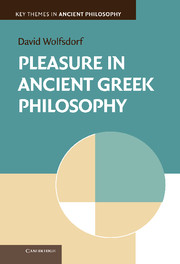Book contents
- Frontmatter
- Contents
- Acknowledgments
- Chapter 1 Introduction
- Chapter 2 Pleasure in early Greek ethics
- Chapter 3 Pleasure in the early physical tradition
- Chapter 4 Plato on pleasure and restoration
- Chapter 5 Plato on true, untrue, and false pleasures
- Chapter 6 Aristotle on pleasure and activation
- Chapter 7 Epicurus and the Cyrenaics on katastematic and kinetic pleasures
- Chapter 8 The Old Stoics on pleasure as passion
- Chapter 9 Contemporary conceptions of pleasure
- Chapter 10 Ancient and contemporary conceptions of pleasure
- Suggestions for further reading
- General Index
- Index of Greek and Latin Words and Expressions
- Index of Quotations from Ancient Authors
- Index of Quotations from Contemporary Authors
Chapter 2 - Pleasure in early Greek ethics
Published online by Cambridge University Press: 05 December 2012
- Frontmatter
- Contents
- Acknowledgments
- Chapter 1 Introduction
- Chapter 2 Pleasure in early Greek ethics
- Chapter 3 Pleasure in the early physical tradition
- Chapter 4 Plato on pleasure and restoration
- Chapter 5 Plato on true, untrue, and false pleasures
- Chapter 6 Aristotle on pleasure and activation
- Chapter 7 Epicurus and the Cyrenaics on katastematic and kinetic pleasures
- Chapter 8 The Old Stoics on pleasure as passion
- Chapter 9 Contemporary conceptions of pleasure
- Chapter 10 Ancient and contemporary conceptions of pleasure
- Suggestions for further reading
- General Index
- Index of Greek and Latin Words and Expressions
- Index of Quotations from Ancient Authors
- Index of Quotations from Contemporary Authors
Summary
The topic of pleasure enters Greek philosophy in the fifth century bce. The principal site of entry is ethics. Early Greek ethical treatments of pleasure focus on whether, how, and to what extent pleasure contributes to a good human life. There is also some discussion of pleasure in the contexts of theology and cosmology, physiology and psychology, all areas explored by so-called Presocratic thinkers we refer to as “philosophers.” I will discuss pleasure in some of those contexts in Chapter 3. Here I discuss the early ethical contributions.
PRODICUS
Prodicus of Ceos (c. 465–395) – a man often but misleadingly referred to as a “sophist” – composed a pedagogical work, one part of which is known as The Choice of Heracles. In The Choice of Heracles, Prodicus presented the mythological hero Heracles as a young man at a crossroads poised to choose a path of life. Feminine figures representing Excellence and Depravity advertised their respective courses. Prodicus’ Choice of Heracles does not survive. However, a rendition of it by the historian and Socratic philosopher Xenophon of Athens (c. 430–354) does. Consider the following passage from Xenophon’s rendition of Depravity’s exhortation:
You [Heracles] will not be concerned with wars or public responsibilities, but with what food or drink you can find to suit your taste, what sight or sound might please you, what scent or touch might delight you, which beloved’s company might gratify you most, how you may sleep most softly, and how you can achieve all this with the least trouble.
(Memorabilia 2.1.24)- Type
- Chapter
- Information
- Pleasure in Ancient Greek Philosophy , pp. 10 - 28Publisher: Cambridge University PressPrint publication year: 2012



